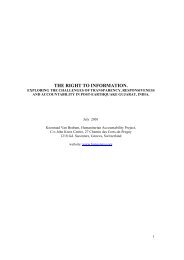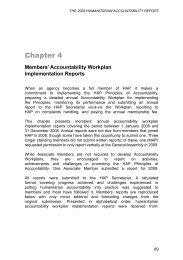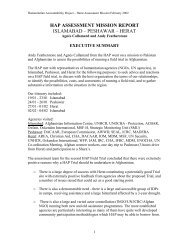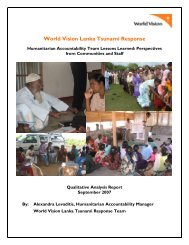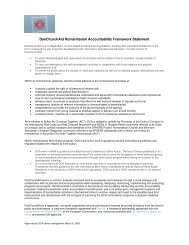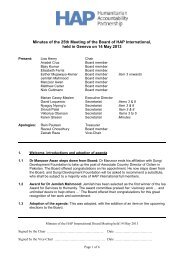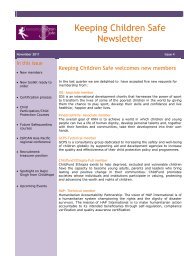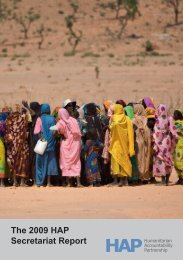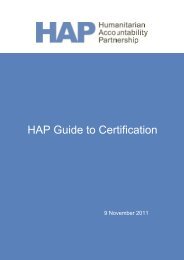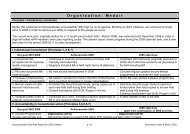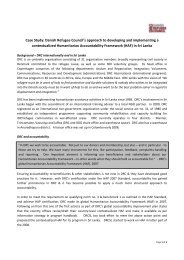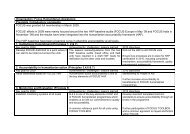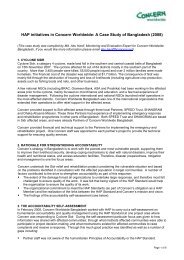Medair - HAP International
Medair - HAP International
Medair - HAP International
You also want an ePaper? Increase the reach of your titles
YUMPU automatically turns print PDFs into web optimized ePapers that Google loves.
2011 Annual Report for <strong>HAP</strong><br />
ORGANISATION: <strong>Medair</strong><br />
Introductory comments (history of accountability work in the organisation, <strong>HAP</strong> membership, accountability framework etc.):<br />
<strong>Medair</strong> is an international, faith-based NGO working with under-served populations in relief and rehabilitation situations after humanitarian<br />
crises, and has been operating out of Lausanne, Switzerland for the last 20 years. We are ZEWO registered, a founding member of the<br />
Humanitarian Accountability Partnership, contributors to the ECB Good Enough Guide, and certified under ISO 9001: 2008 for services to<br />
our ‗customers‘, the beneficiaries in our eight country programmes.<br />
<strong>Medair</strong> continues to champion its accountability to beneficiaries in all of its country programmes, and improve its quality of service delivery<br />
in terms of the on-going integration of participation and accountability in all stages of the project management cycle, in particular linked to<br />
monitoring activities. Each country programme team has a focal point for beneficiary accountability (BA), supported by a BA focal point at<br />
<strong>Medair</strong>‘s head office.<br />
1. Establishing and delivering on commitments<br />
Key goal for 2011 Achievements/ challenges/ lessons learned 2012 objectives<br />
1. BA is incorporated in new organisational<br />
strategy through an initiative on<br />
excellence in programme delivery<br />
2. Continued BA presentations in sector<br />
workshops/ Country Directors Workshop<br />
3. Explore potential of accounting software<br />
to positively impact <strong>Medair</strong>‘s ability to use<br />
resourcing with greater agility in order to<br />
serve beneficiaries more efficiently<br />
4. Attend <strong>HAP</strong>-I General Assembly<br />
5. Continue to distribute Good Enough<br />
Guide electronically; revise <strong>Medair</strong> BA<br />
guidelines<br />
6. Include beneficiary focus on <strong>Medair</strong><br />
website & in <strong>Medair</strong> quarterly<br />
newsletters; send information for <strong>Medair</strong><br />
affiliates to use<br />
7. Harmonise BA briefings at HQ for<br />
internationally recruited staff and in field<br />
8. Review field job descriptions to include<br />
some BA responsibilities as appropriate<br />
1. Excellence in programme delivery included<br />
in organisational strategy through a focus<br />
priority on quality by HQ sector advisors<br />
2. BA included in HQ sector advisors‘<br />
presentation on programme quality to all<br />
country directors at Aug conference, and at<br />
annual WASH conference for field staff<br />
3. Introduction of Navigator software has<br />
allowed more precise tracking of<br />
expenditure and financial visibility, allowing<br />
for appropriate reallocation of resources<br />
4. <strong>HAP</strong>-I GA attended by the Programmes<br />
Manager; no revision undertaken to <strong>Medair</strong><br />
BA guidelines<br />
5. Beneficiary focus has become a regular<br />
feature of <strong>Medair</strong> publicity<br />
6. BA presentation at HQ briefings for<br />
internationally recruited staff rationalised<br />
within project management session<br />
7. Field staff job descriptions reviewed with<br />
regard to BA to fit better with main role<br />
1<br />
1. Sector advisors to work with country<br />
programmes to develop appropriate<br />
programme quality indicators/ dashboard<br />
2. BA to remain a key cross-cutting issue<br />
within <strong>Medair</strong> and part of presentations<br />
3. To extend Navigator to other HQ/ Field<br />
departments will improve visibility in more<br />
programme support areas<br />
4. <strong>Medair</strong> to consider whether a parallel<br />
process to <strong>HAP</strong> certification is possible<br />
within <strong>Medair</strong>‘s quality system<br />
5. Country programmes to continue to<br />
explore how BA principles can be best<br />
contextualised in projects<br />
6. <strong>Medair</strong> HQ to develop a series of selflearning<br />
study modules for new field staff<br />
7. New <strong>HAP</strong> Work Plan to be developed
Afghanistan<br />
To incorporate beneficiary accountability<br />
into all project activities.<br />
D R Congo<br />
Streamlining of BA throughout project<br />
cycle<br />
BA activities currently required in <strong>Medair</strong><br />
COD programmes to be implemented in<br />
all projects in 2011.<br />
By end of 2011, BA activities outlined in<br />
table 2 are systematically implemented in<br />
all <strong>Medair</strong> DRC projects.<br />
Afghanistan<br />
WASH/ CFW projects used surveys/ B<br />
feedback forms to obtain key information<br />
from Bs; helped direct implementation of<br />
programme activities, monitor staff<br />
behaviour/ performance<br />
Significant challenge: rumours/ false<br />
accusations undermined Badakhshan<br />
nutrition programme. Factions within v<br />
conservative area opposed M‘s work with<br />
vulnerable women; dialogue with mullahs/<br />
Bs/ village elders/ community/ district leaders<br />
to resolve issue, but tensions remained<br />
between project & small part of B population<br />
D R Congo<br />
More communication with Bs and partners in<br />
all 3 sectors of activity<br />
Communications with Bs in local languages.<br />
M discussed with officials of relevant gov‘t<br />
ministries/ LAs: (local MoH office, Provincial<br />
Roads Office), before signed conventions/<br />
agreements on nature of project<br />
implementation. Progress reports on work<br />
achieved & intended interventions regularly<br />
communicated in WASH/ rehab. projects<br />
M continued to inform LAs re project<br />
activities, ad hoc then more systematically<br />
throughout 2011, e.g. announced extension<br />
of WASH project from Sep to Dec.<br />
Contracts signed with health centres/ district<br />
health offices supported by <strong>Medair</strong>,<br />
indicating responsibilities of M/ HCs/ DHOs<br />
At start of projects, met with LAs to explain<br />
objectives, then mass communication (where<br />
Afghanistan<br />
Continue to develop and improve<br />
beneficiary feedback forms, to be utilised<br />
in all project activities.<br />
FCO to report back to project managers<br />
with feedback from beneficiary community<br />
obtained through one-on-one interviews.<br />
D R Congo<br />
Continue to ensure that BA remains a<br />
fundamental part of all our projects.<br />
2
Use of ‗Most Significant Change‘ (MSC)<br />
methodology to monitor/ evaluate impact,<br />
without using indicators, in 2+ projects.<br />
Haïti<br />
Review field job descriptions to include<br />
some BA responsibilities as appropriate.<br />
media available) or oral/ written methods in<br />
other areas to reach targeted villages.<br />
Satisfaction surveys conducted at WASH<br />
project sites incl. survey at water points to<br />
evaluate frequency/ utilisation trend; e.g. a<br />
pump not open long enough during day<br />
addressed with well management committee<br />
Knowledge, Attitudes & Practice (KAP)<br />
surveys conducted at onset of WASH project<br />
re hygiene practices in communities. Survey<br />
at end to see if behaviour change achieved.<br />
Intended to use MSC methodology to<br />
measure impact of projects on Bs; not done<br />
Haïti<br />
Haiti - Website contributions: ‗Haiti: One<br />
Year Later: 11,622 Haitians Safely Housed‘ 1 .<br />
(10 Jan 2011); ‗Haiti: What Makes a House a<br />
Home?‘ 2 (11 Jan 2011); ‗Days Are Where<br />
We Live‘ 3 (15 Dec 2011)<br />
Job descriptions with BA responsibilities 4<br />
All proposals/ reports had community<br />
mobilizing & database/ M&E component/<br />
section.<br />
B focus constantly repeated at meetings (i.e.<br />
carpenters encouraged to remember that<br />
building T-shelters for individual families).<br />
Treatment/ interaction by NRS to Bs also<br />
Haïti<br />
To increase capacity of local staff in M&E<br />
techniques to be performed at field level<br />
To complete assessment in new sections<br />
and incorporate this data into existing<br />
database.<br />
All data, including GPS coordinates and<br />
pre- and post-intervention photographs of<br />
each site, to be entered into a database<br />
and linked to Google Earth to allow visual<br />
representations and simplify tracking.<br />
To create labour database to track all work<br />
accomplished and to aid in attaining goal<br />
of gender equity.<br />
1 http://www.medair.org/nc/en/infochanel/news/detail/article/one_year_later_11622_haitians_safely_housed/<br />
2 http://www.medair.org/nc/en/infochanel/news/detail/print/article/what_makes_a_house_a_home/<br />
3 http://www.medair.org/nc/en/infochanel/news/detail/article/days_are_where_we_live/<br />
4 Monitoring and Evaluation Assistant, Monitoring and Evaluation Assistant, Quality, Lead Community Mobilizer, Community Mobilizer, Field Communication<br />
Assistant, Shelter Program Manager Assistant, Technical Officer, Logistics Assistant, Warehouse Assistant, Carpenter and Master Carpenter, IT / Database<br />
Officer<br />
3
BA to be incorporated into all <strong>Medair</strong><br />
AFG proposals/ projects.<br />
BA to be explored by CD at IRS 2011<br />
retreat.<br />
BA understanding/ practice to be<br />
included at staff training in early 2011.<br />
Design in-house M&E training course, pilot<br />
to increase M&E capacity of local staff.<br />
Integrate current database into GIS system<br />
to increase monitoring/ reporting capacity.<br />
Somalia/ Somaliland<br />
Where new activities are starting, or<br />
selection of new sites, <strong>Medair</strong> will engage<br />
with Local Authorities (LAs)/ committees<br />
to ensure appropriate site is selected,<br />
equally accessible to various<br />
beneficiaries.<br />
<strong>Medair</strong> will distribute BA leaflets on a<br />
quarterly basis detailing programme<br />
achievements, future plans, and specific<br />
issues for health and nutrition promotion.<br />
monitored, e.g. some Bs offered food/ coffee<br />
to carpenters/ CFW but cannot be requested<br />
At induction, all M staff read info sheet,<br />
signed document against exploitation of<br />
women/ children; integration of women in<br />
teams addressed in weekly meeting/ at each<br />
field visit during first months<br />
Key Prog & Logistics NRS received training<br />
on Management & Leadership (8 sessions).<br />
Office-based staff received IT training & key<br />
staff received ESL training<br />
2 IRS (M&E manager, HR manager) took 5-<br />
week online M&E training; later designed inhouse<br />
M&E training course for NRS<br />
IT/ Logs officer attended GIS training, then<br />
gave 3 NRS (Database Officer, IT Officer,<br />
LCMO) 2 intro sessions on GIS<br />
Jacmel: all GPS coordinates per B (3,112<br />
points) & per community (41 localities) put in<br />
database & maps created with information.<br />
Somalia/ Somaliland<br />
Health & Nutrition (H&N) sites (Maternal &<br />
Child Health Centres (MCHs), nutrition<br />
distribution sites, mobile immunisation sites)<br />
selected in consultation with communities/<br />
LAs; ensured equal accessibility & services<br />
met communities‘ needs.<br />
H&N BA leaflets not issued on Q basis, as<br />
many Bs illiterate (e.g. children under 5).<br />
H&N promoters/ maternal volunteers<br />
employed to promote H&N messages to B<br />
communities, communicate <strong>Medair</strong>‘s plans/<br />
receive feedback.<br />
Burao: target populations more concentrated<br />
Somalia/ Somaliland<br />
To continue community involvement while<br />
planning activities.<br />
To provide training for health and nutrition<br />
promoters in receiving beneficiary<br />
feedback.<br />
To work with communities to ensure they<br />
can maintain WASH infrastructure after<br />
<strong>Medair</strong> leaves Somaliland.<br />
4
South Sudan<br />
In 2011 <strong>Medair</strong> SDS will continue to<br />
emphasise central importance of a BA<br />
approach in its country strategy. To<br />
implement its strategy a <strong>HAP</strong> focal point will<br />
continue to be responsible for promoting<br />
<strong>HAP</strong> principles/ appropriate <strong>HAP</strong><br />
benchmarks among all staff across its<br />
programmes at all stages of project cycle,<br />
primarily through sector workshops/ new staff<br />
briefings.<br />
so held H&N promotion dramas (Jan 2012)<br />
Partner NGO CCBRS received feedback on<br />
<strong>Medair</strong>‘s H&N activities on our behalf<br />
through our promoters/ volunteers.<br />
WASH sites for latrines, berkad rehab‘n,<br />
shallow well rehab‘n selected in consultation<br />
with communities/ LAs; ensured equal<br />
accessibility, that facilities met communities‘<br />
needs & able to take ownership of them.<br />
WASH BA leaflets issued on quarterly basis<br />
South Sudan<br />
2011 Achievements<br />
o Cross cutting to all projects:<br />
- Retained BA as priority in country strategy<br />
- Retained <strong>HAP</strong> focal point position<br />
- Presented BA principles in all sector<br />
workshops<br />
- Introduced BA to all new staff members<br />
- Required BA updates from project<br />
managers at quarterly meetings<br />
- Kept participatory approaches central to<br />
all projects<br />
o Highlights among projects:<br />
- Conducted post-distribution monitoring<br />
surveys to assess appropriateness of NFI<br />
kits received by Bs<br />
- Presented session on complaints<br />
handling/ message boards during H&N<br />
Workshop & WASH Conference<br />
- Baseline data taken from 2 programme<br />
sites using LQAS survey methodology<br />
- Training & follow-up assessments of<br />
Health & Hygiene Promoters at<br />
Emergency Response Team (ERT) &<br />
static programme sites<br />
5<br />
South Sudan<br />
Integrate BA principles using qualitative<br />
and quantitative methods in each of 2<br />
post-intervention assessments in WASH,<br />
Health, Nutrition & NFI/Shelter sectors as<br />
part of ERT<br />
Integrate message boards with suggestion<br />
boxes and complaint handling mechanism<br />
at programme sites for beneficiary<br />
feedback on programme activities<br />
Implement baseline assessments prior to<br />
all emergency interventions to include<br />
community involvement<br />
Strengthen curriculum of HHP and train<br />
national staff to ensure key hygiene<br />
messages are understood by trainees<br />
Integrate LQAS survey methodology into<br />
ERT interventions<br />
Continue to integrate LQAS within static<br />
programming for baseline and end of<br />
project report
Sudan ( formerly Northern States)<br />
<strong>Medair</strong> SDN to streamline LQAS<br />
monitoring timeframe to avoid rainy &<br />
harvesting seasons<br />
- Successful handover of <strong>Medair</strong> health &<br />
WASH programming in Melut & Manyo to<br />
NGO partner/ local gov‘t authorities<br />
2011 Challenges<br />
o Conflict between communities‘<br />
expectations/ good practice<br />
o Lack of education among communities,<br />
limiting intended accountability processes<br />
o Need to be accountable also to poorly<br />
conceived gov‘t standards<br />
o Communicating essence of accountability<br />
to staff members<br />
o Limits of donor funding practices for BA<br />
o Striking balance between BA &<br />
participation/ empowerment<br />
o Deciding on appropriate trade-offs between<br />
BA & impartiality<br />
2011 Lessons Learned<br />
o Value of refreshing staff on BA at<br />
workshops<br />
o Persist in communicating BA‘s importance<br />
Sudan ( formerly Northern States)<br />
Achieved. LQAS monitoring timeframe<br />
planned for May & Nov, to avoid rainy &<br />
harvesting seasons as much as possible.<br />
2. Staff competency<br />
Key goal for 2011 Achievements/ challenges/ lessons learned 2012 objectives<br />
Afghanistan<br />
Staff training in beneficiary<br />
accountability.<br />
D R Congo<br />
Afghanistan<br />
Staff BA workshop before project activities<br />
began in 2011. Much discussion/ exchange<br />
of ideas regarding importance of treating<br />
Bs with dignity/ handling complaints/<br />
involving them in project cycle.<br />
D R Congo<br />
6<br />
Sudan ( formerly Northern States)<br />
New objectives are not applicable.<br />
<strong>Medair</strong> will close its Sudan country<br />
programme in the first quarter of 2012.<br />
Afghanistan<br />
To further train national staff to include BA.<br />
At induction, to introduce all new staff to M‘s<br />
mission/ mandate/ values; importance of<br />
treating beneficiaries with dignity.<br />
To implement a staff code of conduct.<br />
D R Congo
All <strong>Medair</strong> projects incorporate a BA plan<br />
in their projects by June 2011<br />
Madagascar<br />
No specific objectives for staff<br />
competency were written for 2011.<br />
Somalia/ Somaliland<br />
Maintain a training plan for all staff<br />
(support/ programme), volunteers, and<br />
other people integral to success of<br />
programme.<br />
BA session held with all PMs during annual<br />
Apr projects review meeting; need for BA<br />
plan in each project emphasised…<br />
Project launches held at onset of health<br />
projects; project staff discussed how to<br />
incorporate BA in project activities;<br />
included requirement of sending letters (in<br />
local languages) to partners (clinic staff,<br />
district health office, community health<br />
workers) informing them re scope of<br />
project. Letters submitted to health centres<br />
3 months before end of project to inform<br />
partners of project‘s intended termination.<br />
A plan to communicate services to Bs<br />
required from each programme. Key<br />
elements: use of radio broadcasts,<br />
information provided to community groups<br />
(e.g. churches), signs put in health centres.<br />
Project staff trained on importance of good<br />
communication with communities and on<br />
giving feedback from Bs<br />
Madagascar<br />
BA kept as a priority in M‘s country strategy<br />
BA included in all sector workshops<br />
BA introduced to all staff members<br />
Participatory approaches kept central to all<br />
projects.<br />
Somalia/ Somaliland<br />
<strong>Medair</strong> provided regular training to national<br />
staff (NRS)/ volunteers/ local partners.<br />
NRS training policy enabled staff to apply<br />
for funds for personal studies o/s of work if<br />
relevant to role in <strong>Medair</strong>.<br />
22 NRS (c.50%) had specialised training to<br />
No objectives for 2012.<br />
Madagascar<br />
To continue to ensure that all <strong>Medair</strong> staff,<br />
especially new staff, know what BA is and<br />
how they should behave and act.<br />
Somalia/ Somaliland<br />
To continue on-going staff training activities.<br />
To develop a staff development plan for SOM<br />
programme that encourages internal<br />
promotion of NRS to more senior positions.<br />
To provide ToT (training of trainer) training<br />
for <strong>Medair</strong> H&N staff, to allow them to train<br />
7
help them carry out duties/ improve<br />
education level to benefit DRC after M exits<br />
Total of 31 H&N promoters (21)/ maternal<br />
health volunteers (10) attended 2 refresher<br />
training courses in Apr & Nov; training<br />
provided to 6 infant & young child feeding<br />
promoters, so could train/ mentor 90 more<br />
volunteers at M sites in Burao IDP camps.<br />
20 WASH volunteers received training on<br />
promoting hygiene in community (Feb/ Jul).<br />
As well as hygiene knowledge to pass on<br />
to Bs, volunteers received BA training; they<br />
now pass on comments/ feedback to camp<br />
committees<br />
Our local partner NGO in WASH, IsRC,<br />
(carried out majority of construction work<br />
for WASH projects), also benefited from<br />
<strong>Medair</strong>-provided training; ensured highlyskilled<br />
construction workers will remain in<br />
Somaliland when <strong>Medair</strong> leaves.<br />
3. Sharing information<br />
Key goal for 2011 Achievements/challenges/lessons learned 2012 objectives<br />
Afghanistan<br />
Transparency with beneficiaries and other<br />
stake-holders.<br />
Afghanistan<br />
Signboards used for info sharing in WASH<br />
& food aid projects; due to high levels of<br />
illiteracy in B population, of limited benefit.<br />
Community mobilisers and field foreman<br />
continued to be M‘s most important<br />
resource for information-sharing within field<br />
across all project activities.<br />
PMs worked closely with community<br />
leaders/ representatives, plus shura<br />
leaders/ heads of CDCs/ district governors<br />
to exchange info re M, project activities,<br />
and future planning.<br />
8<br />
promoters and volunteers.<br />
To provide water quality testing training for<br />
WASH staff.<br />
Afghanistan<br />
<strong>Medair</strong> management team and project<br />
managers to continue ―hands on‖ approach<br />
to working with beneficiaries to ensure<br />
accurate information sharing and<br />
transparency.
D R Congo<br />
To keep beneficiaries and partners better<br />
informed on projects<br />
Sharing information with other agencies<br />
Haïti<br />
Internal project evaluation implemented in<br />
Jan 2011; will include FGDs with<br />
community leaders/ shelter beneficiaries/<br />
CFW beneficiaries/ other community<br />
members (i.e. non-beneficiaries). Timed to<br />
gather information on programme‘s<br />
successes/ weaknesses for on-going<br />
programme & design of future proposals.<br />
Leaflets combining written/ pictorial<br />
representation of key details already<br />
designed; awaiting production before being<br />
delivered amongst community to aid<br />
D R Congo<br />
Posters re services on offer/ participating<br />
health centres/ targeted Bs/ duration of<br />
projects posted on clinics supported in<br />
health projects.<br />
Radio communication went beyond<br />
announcing availability of services:<br />
developed to include skits on thematic<br />
areas (sexual violence/ survivors to seek<br />
treatment/ educating communities against<br />
stigmatisation of survivors). Medical<br />
Coordinator participated in radio show,<br />
answered questions from Bs.<br />
Summary for BA activities implemented/<br />
planned in malaria project presented at<br />
partners‘ workshop with donor SANRU in<br />
Kinshasa on how <strong>Medair</strong> engages with Bs.<br />
Increased efforts to send regular updates<br />
on project activities to Clusters plus other<br />
coordination mechanisms, e.g. OCHA<br />
weekly and monthly reports.<br />
Haïti<br />
Questionnaires for mid-term evaluation<br />
completed by: current and past M Haiti Int‘l<br />
& Nat‘l field staff, HQ staff, donors (USAID/<br />
OFDA) & other NGOs as well as from<br />
secondary data from Shelter Cluster<br />
reports, Nat‘l/ Local assessments/ reports.<br />
Internal project evaluation completed.<br />
information for evaluation collected through<br />
individual HH surveys completed by 10% of<br />
randomly selected Bs; technical quality<br />
checks; FGDs held in each area with: Local<br />
community leaders (CASECs/ ASECs), Bs<br />
D R Congo<br />
Establish system to foster information sharing<br />
on good BA practices between projects.<br />
Haïti<br />
Lessons learnt documentation will be<br />
recorded throughout and shared in final<br />
report on the Côtes-de-Fer project.<br />
9
information provision.<br />
Madagascar<br />
We will continue with Radio programme<br />
about keeping beneficiaries updated on<br />
project progress and giving rooms for<br />
them to express and give feedback on<br />
how <strong>Medair</strong> can better improve its work.<br />
Somalia/ Somaliland<br />
Ensure LAs receive monthly reports.<br />
Ensure government departments receive<br />
quarterly reports.<br />
Sudan ( formerly Northern States)<br />
For each project coordinator to include<br />
<strong>HAP</strong>/BAP portion in monthly sitreps<br />
& community groups<br />
Madagascar<br />
<strong>Medair</strong> continued with Radio programme<br />
through 65 emissions to keep Bs updated<br />
on project progress; People listen to radio,<br />
so good way to give them updates on<br />
projects or communicate any information.<br />
Somalia/ Somaliland<br />
LAs receive monthly situation report,<br />
detailing progress on all on-going <strong>Medair</strong><br />
projects, including BA steps if relevant.<br />
Gov‘t departments received quarterly<br />
reports re progress on on-going projects.<br />
Other INGOs active in H&N in country<br />
aware of M activities through participation<br />
in Health Cluster & Nutrition Cluster<br />
Somaliland meetings, augmented with<br />
bilateral meetings with selected INGOs.<br />
Sudan ( formerly Northern States)<br />
Partly achieved; not all project coordinators<br />
reported on <strong>HAP</strong>/BAP monthly. Sit reps<br />
often report on meetings with communities/<br />
water user committees/ village health<br />
committees, considered to be important<br />
way for giving voice to communities.<br />
4. Participation<br />
Key goal for 2011 Achievements/challenges/lessons learned 2012 objectives<br />
Afghanistan<br />
To maintain a high level of beneficiary<br />
participation in project planning and<br />
implementation.<br />
Afghanistan<br />
Food aid project led by B community in<br />
selecting vulnerable HHs for special cash<br />
distribution.<br />
CFW activities chosen in partnership with<br />
local CDCs/ community representatives.<br />
All WASH projects began with<br />
10<br />
Madagascar<br />
<strong>Medair</strong> already has many ways to share<br />
information with beneficiaries, for example:<br />
flyers, radio emissions, workshops, field<br />
agents, posters.<br />
No specific 2012 objectives for this section.<br />
Somalia/ Somaliland<br />
Continue distributing reports to LAs and<br />
government departments.<br />
<strong>Medair</strong> will participate in Somaliland Ministry<br />
of Health annual review meetings (partners<br />
meeting and UNICEF meeting) for 2011<br />
achievements and 2012 plans.<br />
Sudan ( formerly Northern States)<br />
N/A<br />
Afghanistan<br />
To maintain <strong>Medair</strong>‘s high standard of having<br />
beneficiaries actively participating in project<br />
planning and implementation.
D R Congo<br />
Encourage continuous exchange with<br />
partners and beneficiaries.<br />
Working with community members to<br />
better serve beneficiaries.<br />
communities/ <strong>Medair</strong> signing agreement<br />
outlining responsibilities of each to project.<br />
Bs actively participated in selecting WASH<br />
sites, involved in all construction work.<br />
D R Congo<br />
Communiqués with project intentions/areas<br />
of intervention sent to chiefs/ pastors/ other<br />
local leaders. Bridge rehabilitation: monthly<br />
communiqués had a feedback form from<br />
communities asking for comments/<br />
reactions to intended/ already completeded<br />
work. WASH communiqués had table with<br />
all project areas, planned plus upcoming<br />
activities, within construction/ sensitisation<br />
themes of project, plus role of hygiene<br />
promoters in communities<br />
Communiqués in simple, easy-to-read<br />
French; before & after photos of project<br />
sites<br />
BA report also developed for bridge rehab<br />
project, submitted by project supervisors to<br />
LAs: summarised meetings, discussions,<br />
formal & informal exchanges conducted<br />
with direct/ indirect Bs throughout project.<br />
<strong>Medair</strong> continued to work with community<br />
health workers (CHWs), integral to health<br />
interventions as link project to communities<br />
by ensuring they receive project info &<br />
relate their concerns to clinic/ project staff.<br />
WASH project: hygiene promoters selected<br />
from communities where project worked;<br />
helped project staff to understand local<br />
cultures/ behaviours; enabled project‘s<br />
community mobilisers to plan appropriate<br />
behaviour change training and effective<br />
11
Haïti<br />
Community-wide training programme<br />
planned for Q1 of 2011 to increase<br />
community‘s awareness & capacity in<br />
effective construction techniques in<br />
earthquake & hurricane areas.<br />
Madagascar<br />
We will keep BA of central importance in<br />
participatory approach.<br />
communication channels to reach Bs; e.g.<br />
key messages during church services<br />
Haïti<br />
<strong>Medair</strong> prioritised employing women in<br />
construction teams (see HTI case study)<br />
Training in communities increased capacity<br />
& benefited those who had not received a<br />
house. 2 community-wide training<br />
programmes developed with support of<br />
locally-staffed team equipped with<br />
technical/ teaching/ language skills to<br />
implement in all communities where M<br />
worked: a) Mar – Jun: 5,185 participants<br />
(2,826 women/ 2,359 men) in 68 training<br />
sessions (39 sessions in Jacmel, 29 across<br />
La Montagne). Objective: raise awareness<br />
on DRR construction, motivate to work on<br />
own dwellings, correctly; b) Dec: second<br />
training had 414 participants (Bs/ non-Bs,<br />
193 women). Training: 3 hour theory, 2<br />
days‘ practice (masonry & carpentry work)<br />
BA setup included: Community meetings,<br />
Community Information Boards, B<br />
Satisfaction Questionnaires, & a Field<br />
Communication team.<br />
Côtes-de-Fer: initial assessments for new<br />
construction done for 3 of 4 sections using<br />
input of local leaders, & Bs selected. But<br />
some areas not mentioned by CASECs/<br />
ASECs later identified by M as vulnerable<br />
Madagascar<br />
<strong>Medair</strong> continued to keep BA of central<br />
importance in participatory approach, by<br />
organising workshops with beneficiaries to<br />
Haïti<br />
To conduct comprehensive shelter repairs<br />
and WASH assessment of sections 1,2,5&6.<br />
Community Mobilisers (CMs) to be teamed<br />
with Shelter Technical Officer (STOs) &<br />
WASH officer for assessment. Homes to be<br />
assessed for damage from 2010 earthquake,<br />
availability of clean water, & access to a<br />
latrine. Families of each home will also be<br />
assessed for vulnerability/ eligibility for<br />
participation in repairs & WASH programme.<br />
To be undertaken using participatory<br />
methods, e.g. feedback from community<br />
leaders, FGDs, community meetings, & B<br />
surveys plus evaluation through quantitative<br />
methods, e.g. shelter data reports. To occur<br />
during on-site & off-site supervision visits.<br />
Community leaders (CASECs & ASECs) with<br />
CMs to make initial & final B selection lists<br />
Community boards to be placed in all project<br />
areas<br />
To work with local communities/ community<br />
leaders in each zone during comprehensive<br />
assessment & for duration of repairs/ WASH<br />
activities. At project close, these<br />
relationships to be used to distribute tools<br />
from programme for community members to<br />
borrow for home repair/ latrine construction<br />
Madagascar<br />
To continue to keep BA of central importance<br />
in participatory approach, by organising 20<br />
workshops with Bs to listen to needs/<br />
12
Sudan ( formerly Northern States)<br />
<strong>Medair</strong> SDN will encourage and involve their<br />
listen to their suggestions and complaints, to<br />
explain what M was doing and future actions.<br />
Dec: workshop heard beneficiaries‘ feedback<br />
on last project/ suggestions on next one.<br />
Somalia/ Somaliland<br />
All M nutrition distributions carried out with<br />
unskilled community members; then trained<br />
to aid with distributing supplies to Bs.<br />
Health & nutrition (H&N) promoters/<br />
maternal health volunteers recruited from<br />
communities they work in. Short list of<br />
potential promoters/ volunteers (Ps/Vs)<br />
drawn up by community leaders; final<br />
selection by M; ensured that communities<br />
M worked with received relevant training<br />
themselves, skills remained in community<br />
after M leaves, community leaders more<br />
responsible for Ps/Vs active in community.<br />
Mar 2011: M trained camp committees of<br />
14 Burao IDP camps plus 7 rural Toghdeer<br />
villages with WASH activities. 5 members<br />
of each camp/ village committee drawn<br />
together for training so communities could<br />
collaborate better with M, by assisting in<br />
WASH activities/ providing relevant feedbk.<br />
WASH activities: M facilitated community<br />
participation, specifically communities<br />
provided materials (sand, aggregate) &<br />
unskilled labour; participation varied from<br />
site to site, depending on local conditions.<br />
Sudan ( formerly Northern States)<br />
Achieved. <strong>Medair</strong>‘s local partner NGO DRA<br />
suggestions/ complaints. For ER, to develop<br />
simple template to collect Bs‘ needs/<br />
suggestions. At end of response, requests to<br />
be compared with actions taken to give Bs<br />
feedback by radio on what M did, & why some<br />
needs previously expressed not responded to.<br />
Somalia/ Somaliland<br />
To continue to recruit unskilled community<br />
members to take part in distribution activities.<br />
To continue to engage with community<br />
leaders to enable local recruitment of health<br />
& nutrition promoters/ maternal health<br />
volunteers.<br />
To continue to seek community feedback and<br />
involvement in design/ execution of WASH<br />
projects.<br />
To encourage communities to provide<br />
relevant feedback regarding need for major<br />
repairs of WASH infrastructure.<br />
To promote project sustainability by gradually<br />
increasing community contribution to WASH<br />
projects; specifically for communities to take<br />
responsibility for on-going maintenance/<br />
cleaning/ minor repairs.<br />
Sudan ( formerly Northern States)<br />
N/A<br />
13
national NGO partner in new BA activities.<br />
was central to training of WUCs/ VHCs in Um<br />
Shalaya area of W Darfur. Also, DRA<br />
continually engaged in discussions with B<br />
communities re programme quality.<br />
SOS Sahel, <strong>Medair</strong>‘s local partner NGO in S<br />
Kordofan:<br />
5. Handling complaints<br />
Key goal for 2011 Achievements/ challenges/ lessons learned 2012 objectives<br />
Afghanistan<br />
Develop complaint handling procedures.<br />
D R Congo<br />
Establish and continuously monitor a<br />
feedback handling mechanism in all<br />
projects<br />
Afghanistan<br />
Challenge to establish effective mechanism<br />
to receive complaints due to high rates of<br />
illiteracy within B population.<br />
Communities often reluctant to complain to<br />
<strong>Medair</strong> directly; instead, locally-recruited<br />
staff told senior staff of rumours/ concerns<br />
being discussed in local community; e.g.<br />
nutrition team worked hard to investigate<br />
rumours & address underlying B concerns<br />
D R Congo<br />
Suggestion boxes placed strategically,<br />
including at health centres/ in communities<br />
with WASH installations. Comments recvd<br />
were collated, letter sent to relevant<br />
communities/ health centres/ LAs detailing<br />
what M offered within respective projects<br />
Most comments received not related to<br />
<strong>Medair</strong>‘s project work, or were complaints<br />
re rate of pay for day labourers etc.<br />
Some letters received written in languages<br />
unknown to <strong>Medair</strong>‘s national staff.<br />
However, comments directly involving<br />
projects (e.g. attitude of health<br />
professionals in HCs) discussed with Ango<br />
project staff, feedback communicated to<br />
Afghanistan<br />
Maintain and develop confidence with<br />
beneficiaries/ community representatives so<br />
concerns/ complaints can be openly<br />
expressed.<br />
D R Congo<br />
Where possible factor in stakeholder<br />
feedback to future projects.<br />
Projects to plan for more time to explain to<br />
communities what is described in the<br />
communiqués.<br />
14
Haïti<br />
Internal project evaluation implemented<br />
in Jan 2011; will include FGDs with<br />
community leaders/ shelter Bs/ CFW Bs/<br />
other community members (i.e. non-Bs).<br />
Timed to gather information on<br />
programme‘s successes/ weaknesses to<br />
influence on-going programme & design<br />
of future proposals.<br />
Leaflets combining written/ pictorial<br />
representation of key details already<br />
designed; awaiting production before<br />
being delivered amongst community to<br />
aid information provision.<br />
Community-wide training programme<br />
planned for Q1 of 2011 to increase<br />
community‘s awareness & capacity in<br />
effective construction techniques in<br />
earthquake & hurricane areas.<br />
Strategy being implemented to increase<br />
effectiveness of community messaging/<br />
training.<br />
Madagascar<br />
We will install additional signboards and<br />
suggestion box in 4 other villages.<br />
clinics. Comments re gaps in delivery of<br />
medicine helped project staff to develop<br />
better system to monitor/ distribute this<br />
Some feedback received could not be<br />
factored into current project but offered<br />
valuable lessons for future projects.<br />
FGDs held with CHWs for health projects/<br />
hygiene promoters/ B groups in WASH<br />
project to receive feedback on relevant<br />
issues concerning projects.<br />
Haïti<br />
Mid-term internal evaluation in Feb 2011.<br />
Most recommendations implemented in<br />
current programme at time of data<br />
collection, used to plan next programme.<br />
M&E data fed directly to programme<br />
management, any required changes made<br />
Complaints mechanism: CMs in active<br />
project areas trained in communication<br />
skills/ conflict resolution/ handling<br />
complaints; if unable to provide appropriate<br />
response to B/ community member, liaised<br />
with LCMO, M&E Assistant, PMA or PM.<br />
One key senior staff appointed as focal<br />
point for all complaints; Bs could directly<br />
approach this person, who carried a<br />
―Complaints Mobile‖ phone (no. on<br />
Community boards). ―Complaints forms‖<br />
filled out at field level, if someone came to<br />
office/ called mobile; M&E/ Programs then<br />
responded before complaint filed.<br />
Madagascar<br />
Not achieved: experience showed this way<br />
of getting feed-back from beneficiaries was<br />
Haïti<br />
Create a database for all complaints and<br />
measure importance of each to respond<br />
better to beneficiary needs before complaints<br />
arise.<br />
Develop system to encourage beneficiary<br />
feedback in the early stages of all<br />
programme activities to register and seek<br />
resolution of complaints.<br />
Make information on complaint mechanisms<br />
for programmes a standard component of all<br />
community meetings/ training sessions.<br />
Madagascar<br />
Through field agents visits, open channel<br />
radio emissions and focus groups, we will<br />
15
Somalia/ Somaliland<br />
To conduct appropriate surveys on a<br />
monthly basis.<br />
Sudan Northern States<br />
1. Explore option of incorporating complaint<br />
boxes/ new channels for beneficiaries to<br />
provide feedback<br />
not efficient in this area.<br />
Somalia/ Somaliland<br />
‗Smiley‘ surveys attempted to measure<br />
health project Bs‘ feedback at MCHs<br />
supported, but ineffectual: high % of Bs<br />
unwilling to complete survey forms.<br />
Local partner NGO, CCBRS, received<br />
complaints re H&N activities on <strong>Medair</strong>‘s<br />
behalf/ gave feedback to M/ liaised with<br />
communities to resolve problems.<br />
M maintained complaints box in all Burao<br />
MCHs; allowed anonymity.<br />
Efforts to conduct surveys of Bs‘ opinions<br />
of WASH projects hampered by continual<br />
receipt of irrelevant commentary.<br />
As alternative to monthly surveys, WASH<br />
projects developed reporting system<br />
whereby WASH hygiene volunteers/ IDP<br />
camp & village leadership committees were<br />
trained in receiving feedback regarding<br />
<strong>Medair</strong> WASH activities in communities;<br />
recorded in committees‘ site minutes book<br />
Monthly meetings to discuss WASH<br />
activities held at each site.<br />
Sudan ( formerly Northern States)<br />
1. Partly achieved. Complaint boxes not<br />
installed, no trial done. In S Kordofan,<br />
WASH activities managed remotely when<br />
fighting erupted, so phone calls with key<br />
locals in inaccessible locations to obtain<br />
feedback on work by contracted parties. In<br />
encourage the beneficiaries to express their<br />
complaints and suggestions. We will keep a<br />
file with all feedback received and give<br />
answers twice per year though radio channel.<br />
Somalia/ Somaliland<br />
To hold monthly focus group meetings at<br />
sites where we have H&N activities.<br />
To revise/ improve complaints box system at<br />
Burao MCHs. To incorporate all MCHs<br />
supported in Somaliland into revised system.<br />
For community committees to continue<br />
recording feedback at each WASH site.<br />
To introduce a standardised form of<br />
recording and evaluating all feedback at a<br />
central point (ie <strong>Medair</strong> Somaliland HQ).<br />
Village Committee trainings in BA<br />
Sudan ( formerly Northern States)<br />
N/A<br />
16
W Darfur, health staff collected feedback<br />
during supervisory visits re level of B<br />
satisfaction with services provided.<br />
2. Include BA—addressing complaints in 2. Partly achieved: work plan changed several<br />
workplan for WASH/ Health activities times during 2011, after Jul had strong<br />
focus on exiting. Communities informed in<br />
time re exit/ handover procedures, but<br />
limited space to adjust exit plans. When<br />
implementing sanitation programme in<br />
Ardamata IDP camp (only for Extremely<br />
Vulnerable Individuals), sheiks consulted,<br />
who conducted own survey (disagreed with<br />
M‘s initial results). Survey verified, then<br />
used for programme implementation. For<br />
writing proposals, health dep‘t collected B<br />
input during meetings with VHCs<br />
3. Train national staff on conducting proper 3. Not achieved. No additional WASH/ health<br />
Focus Group Discussions (FGDs) in national staff received FGD training in<br />
communities<br />
2011. In past, WASH team used FGDs<br />
mainly for quantitative data gathering, but<br />
inaccurate; to date no transition to more<br />
qualitative data gathering through FGDs.<br />
4. Increase no. of formal FGDs conducted by 4. Not achieved: No overall increase in no. of<br />
national staff<br />
FDGs: no. of formal FGDs by WASH staff<br />
reduced to zero; slight increase for health.<br />
Previously only VHCs targeted in FGDs;<br />
but in 2011 health promotion team also<br />
conducted FGDs with women addressing<br />
their specific issues. FGDs in VHCs utilised<br />
to indicate what messaging was needed,<br />
get input on assistance needed, motivate<br />
them to take ownership of health situation<br />
in own community by supporting voluntary<br />
health promotion programmes, providing<br />
incentives for clinic guards/ cleaners etc.<br />
17
6. Learning and continual improvement<br />
Key goal for 2011 Achievements/challenges/lessons learned 2012 objectives<br />
Afghanistan<br />
Attend <strong>HAP</strong> training to develop better<br />
beneficiary accountability practice.<br />
D R Congo<br />
Enhancing knowledge on behaviours<br />
and practices within communities where<br />
we work<br />
Training communities on cross cutting<br />
themes<br />
Haïti<br />
Full internal project evaluation Jan 2011.<br />
Afghanistan<br />
<strong>Medair</strong>‘s BA focal point attended 3-day BA<br />
training course: informed development of<br />
BA strategy for country.<br />
D R Congo<br />
Hygiene promoters from each location<br />
targeted in WASH project trained on<br />
behaviour change, to ensure sensitizing<br />
communities continues after project ends.<br />
Post-training session, participants gave<br />
feedback, suggested poss. improvements.<br />
1,200+ day labourers (23% women) hired<br />
from communities to work on rehab project;<br />
trained on preventing sleeping sickness/<br />
HIV/ equality/ respect for gender, so could<br />
extend knowledge to others in community.<br />
Haïti<br />
Internal evaluation 1 year after earthquake<br />
reviewed ER programme quality to date cf<br />
DAC criteria (relevance, effectiveness,<br />
efficiency, impact, sustainability);<br />
suggested improvements for design/<br />
planning of future proposals for working in<br />
communities in SE Haiti/ future shelter ER<br />
programmes; evaluation included HH<br />
surveys; FGDs in each area (Bs, non-Bs,<br />
local community leaders); questionnaires<br />
completed by current/ ex- M Haiti<br />
<strong>International</strong>/ National field staff, HQ staff,<br />
USAID/OFDA (Donor), other NGOs; data<br />
from Shelter Cluster reports, National/<br />
Local assessments and reports.<br />
Afghanistan<br />
Further develop a team culture where<br />
beneficiary accountability is inherent in our<br />
work and interaction with beneficiaries.<br />
D R Congo<br />
None<br />
Haïti<br />
To conduct a comprehensive shelter repairs<br />
and WASH assessment of sections 1, 2, 5 &<br />
6 (Phases 2 & 3). CMs to be teamed with a<br />
Shelter & WASH Officer for assessment.<br />
Each home in these sections to be assessed<br />
for damage from 12 Jan 2010 earthquake/<br />
availability of clean water/ access to latrine.<br />
Families to be assessed for vulnerability/<br />
eligibility before participating in repairs/<br />
WASH programme.<br />
STOs supervising repair crews to provide onthe-job<br />
training for carpenters/ masons/<br />
casual labour assistants; to also provide<br />
briefings/ short trainings for Bs in<br />
earthquake- & hurricane-resistant repair<br />
18
Madagascar<br />
No objectives for 2011 in this section.<br />
Sudan ( formerly Northern States)<br />
Increase CATS (Community Approach to<br />
Total Sanitation) intervention in<br />
communities ready to take sanitation<br />
approach<br />
Beneficiary satisfaction survey with 10% of<br />
all Bs undertaken by end of project.<br />
Madagascar<br />
Recognised need to better understand Bs‘<br />
culture, taboos, and common ways to<br />
communicate for effective B accountability.<br />
Somalia/ Somaliland<br />
Jan 2012: External consultant to evaluate<br />
nutrition activities through B FGDs & other<br />
methods; report to be used to improve<br />
services in 2012.<br />
Throughout 2011 WASH team trained<br />
communities in use of new facilities &<br />
equipment, e.g. ceramic water filters, dome<br />
slab latrines<br />
Sudan ( formerly Northern States)<br />
Achieved. M successfully expanded CATS<br />
activities from 1 province (S Kordofan) to 2 (+<br />
W Darfur). More villages now ‗open<br />
defecation free‘; experiences shared with<br />
WASH Cluster (i.e. gov‘t line ministries, UN,<br />
(I)NGOs) in W Darfur.<br />
Case study/example: Good practice in accountability and quality management<br />
Refer to separate case studies annexed to this report.<br />
Plans with regard to <strong>HAP</strong> services: baseline analysis or certification?<br />
techniques/ personal safety.<br />
Madagascar<br />
To study local culture, taboos and ways to<br />
communicate with 30 local families; capitalise<br />
all information into a study file; then set up<br />
accurate way to ensure BA in future.<br />
Somalia/ Somaliland<br />
To implement changes to nutrition activities<br />
advised in January 2012 evaluation report<br />
To continue training beneficiaries in use of<br />
new WASH facilities and equipment<br />
To develop with B communities indigenous<br />
funding mechanisms for maintaining their<br />
WASH facilities (incl. high-cost facilities e.g.<br />
berkads) after <strong>Medair</strong> has left country<br />
Sudan ( formerly Northern States)<br />
N/A<br />
Not at this stage; <strong>Medair</strong> is considering how a similar baseline analysis process to <strong>HAP</strong> could be incorporated into our activities.<br />
Progress/highlights from programme sites (if not covered elsewhere in report):<br />
Refer to separate case studies annexed to this report.<br />
Summary and any other comments:<br />
None<br />
19




